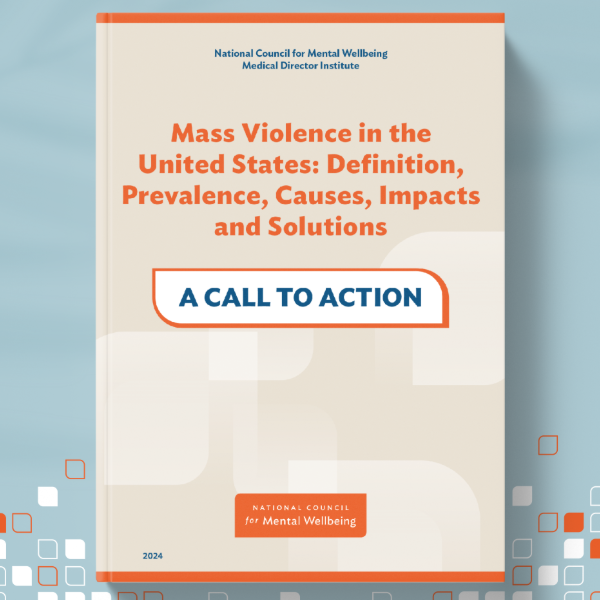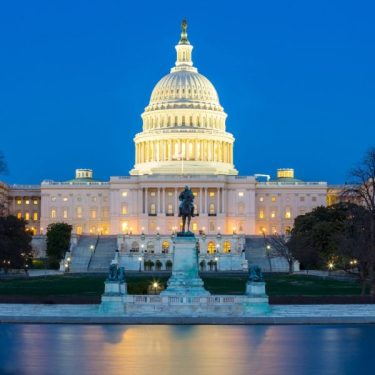WASHINGTON, D.C. (Dec. 10, 2024) — According to a revised and updated report by the Medical Director Institute (MDI) of the National Council for Mental Wellbeing, Mass Violence in the United States: Definition, Prevalence, Causes, Impacts and Solutions, mass violence continues to escalate in the United States, and more must be done to address the increase.
The findings build upon a 2019 report created by the MDI and a diverse team of policy and medical experts to examine contributing factors and actionable solutions to mass violence in the U.S. through the lens of behavioral health.
In the new report, the team found that incidents of mass violence, while still relatively rare, are increasing — and the time to respond is now.
“We have the ability to take effective steps right now to curtail mass violence, but we have not adequately addressed the crisis,” said National Council Medical Director Joe Parks, MD, cochair of the MDI. “This is a major public health problem, one no other country is facing to this degree, and we all should be doing more to stem it. While we cannot predict who will commit an act of mass violence, we can adopt a public health approach to prevent violence by reducing risk.”
While acknowledging the role mental illness can play in some cases of mass violence, the report says the media and members of the public too quickly blame mental illness for all mass violence. This is despite the fact that very few mass violence perpetrators have a major psychiatric disorder.
“There are a very small portion of mental illnesses that do result in an increased potential for violence,” Dr. Parks said. “In the vast majority of mass attacks, it’s not mental health to blame, but hate and anger. Hate and anger are not mental illnesses.”
The updated report found that mass attacks, while still relatively rare, are indeed becoming more frequent and more deadly. From 2000-2016, mass violence accounted for only 0.2% of homicides in the United States. In the last few years, that has increased to nearly 1%.
“This update of 2019’s groundbreaking report outlines what we currently know about mass attacks and offers significant recommendations on how to stop them from happening,” National Council President and CEO Chuck Ingoglia said. “It’s crucial that we arrive at a uniform definition of mass violence and support research on the nature of attackers and what contributed to their actions, including neurobiological, psychological and sociological factors.”
The report calls for expanding the use of and funding for threat assessment teams that can identify potential attackers and address situations before they approach crisis levels.
Among the report’s findings and recommendations:
- The Bipartisan Safer Communities Act, which began funding programs in February 2023, and other resources should be used to increase the availability of well-trained, multidisciplinary behavioral threat assessment and management teams.
- Schools should focus on effective disciplinary measures and student support services.
- Health care organization staff should be trained in lethal means reduction, a rational strategy for reducing lethal violence, which is very helpful in combating suicide.
- We should prioritize interventions for people who may need more support based on particular personality traits, diagnoses or life circumstances that put them at a higher risk for committing violence.
- The 988 Suicide & Crisis Lifeline and other crisis call centers should include harm-to-others portions in their risk assessments, separate from the harm-to-self portions.
The expert panel for this 2024 revised update of the 2019 paper was led by:
- Joe Parks, MD, Medical Director, National Council for Mental Wellbeing
- Jacqueline Feldman, MD, Professor Emeritus, Department of Psychiatry and Behavioral Neurobiology, School of Medicine, University of Alabama at Birmingham; Associate Medical Director, National Alliance on Mental Illness
- John Rozel, MD, MSL, DFAPA, Medical Director, resolve Crisis Services, UPMC Western Psychiatric Hospital; Professor of Psychiatry and Adjunct Professor of Law, University of Pittsburgh
Methodology
The MDI brought together a diverse group of practitioners, administrators, policymakers, researchers, educators, advocates, payers, patients and family members to ensure a discussion from a variety of viewpoints. Each provided literature and research from their area of expertise. A technical writer and coeditors recorded the proceedings and provided additional context from outside literature and sources. The recommendations contained in the report are concrete, specific and actionable.
About the Medical Director Institute
The MDI advises the National Council board, staff and membership on issues and topics heavily impacted by clinical practice and provide longer-term guidance through a series of technical papers. The MDI is primarily composed of medical directors from National Council member organizations. View the full roster on the MDI webpage.
This report challenges common misconceptions about the relationship between mental illness and mass violence.
About The National Council
Founded in 1969, the National Council for Mental Wellbeing is a membership organization that drives policy and social change on behalf of over 3,200 mental health and substance use treatment organizations and the more than 15 million children, adults and families they serve. We advocate for policies to ensure access to high-quality services. We build the capacity of mental health and substance use treatment organizations. And we promote greater understanding of mental wellbeing as a core component of comprehensive health and health care. Through our Mental Health First Aid (MHFA) program, we have trained more than 4.5 million people in the U.S. to identify, understand and respond to signs and symptoms of mental health and substance use challenges.
Media Contact
Sophia Majlessi
Media@TheNationalCouncil.org
202-621-1631



